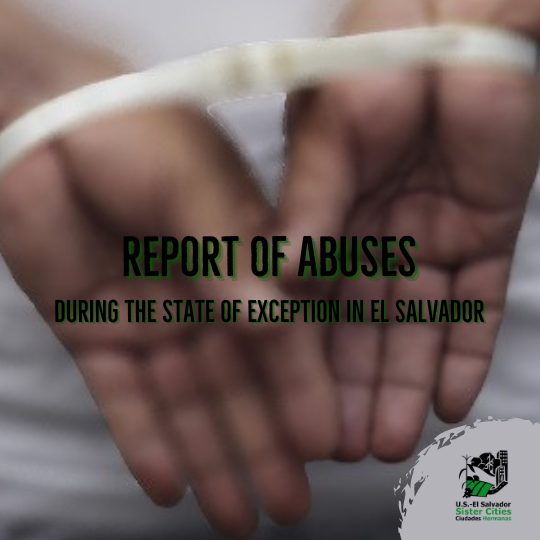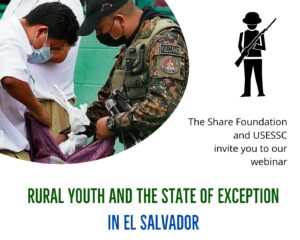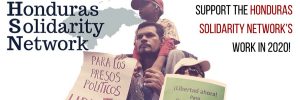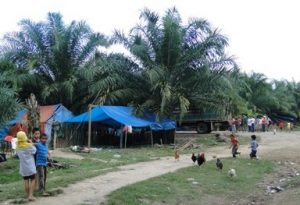Human Rights
On-going human rights violations during the exception regime in El Salvador
Lissette Lemus recently reported for EL DIARIO DE HOY that seven social organizations of El Salvador have collected a total of 4,071 complaints of human rights violations commited by State agents during the on-going exception regime declared in March 2022.
According to the data collected, thousands of people have been victims of abuses by the authorities. The most serious allegations are: arbitrary arrests, harassment, threats, injuries and deaths.
The data shows that the majority of complaints of human rights violations are related to arbitrary arrests. For example, in Cristosal they are 97.2%; the Foundation of Studies for the Application of Law (FESPAD), 80.8%; the Passionist Social Service (SSPAS), 90.2%; the Human Rights Institute of the UCA (IDHUCA), 79.7%; the Salvadoran Network of Human Rights Defenders 76%; the Amate Association, 73%, and Azul Originario, 100% of the complaints.

At the beginning of October, EL DIARIO DE HOY also published the testimony of “Juan”, a person who was arrested in April and had to endure the violence within the prison until his release. We have translated parts of that article.
The physical torture began upon admission. As soon as the guards arrived, they were beaten with no less than four blows, with such force that many did not recover for two or three days, while lying on the floor.
They were only fed a tortilla with beans each day, they were not given water to drink, they were tear-gassed in the cells, they were counted up to three times a night to prevent them from sleeping.
“Damn, you are the scum of the country. The president does not want you. We have orders that you die, we have orders not to feed you, but we are good and we give you a tortilla, dogs.”
That was part of the psychological torture the guards inflicted on them. They yelled at them frequently or when someone complained of pain or asked for help for someone who was sick or passed out.
“They grabbed me as if they were beating beans. I spent three days lying down, I couldn’t even move”, he says, adding that, as soon as he manages to collect some money, he will seek a medical check-up because he feels bad. “I didn’t have any illnesses before, but today I feel dizzy sometimes”.
“The first days were hard; I entered during the hardest days. For the custodians, we are all gang members. In those days, all they gave us for food was one tortilla for the whole day. Around 6:00 in the afternoon they would give us another one.”
“Honestly, I’m not embarrassed to say that I kept crying. Your mind is not prepared for that,” says Juan, about the time he spent in cell 30, of sector five, where he entered, together with gang members and people with artistic tattoos.
“…In cell 32 I saw people die. They were three young men. They looked healthy, but suddenly they fell unconscious. One asked for help but no one came. Sometimes, among ourselves, we tried to help them, giving them air, they recovered, but after a while they fell back and were gone”.
The cruelty inside the prison, according to Juan, reached such a point that one could not even speak. No noise should be made, much less shouting for help, because guards would arrive to throw tear gas grenades into the cells.
According to Juan, when they watched the grenade fall into the cell, the person in charge of the cell sent the oldest and weakest to the door, so that they would have a better chance of breathing, and the youngest far behind.
Everyone took their shirts off and waved them in the hope of getting the gas out. “It’s sad, that’s hard. They just try to hurt you,” says Juan, adding that during his time in prison, they were “gassed” three times.
Another form of punishment, says the former prisoner, was taking away the water. No one bathed, no one defecated. Nobody drank.
“… One had to endure up to 13 or 15 days without defecating. When the person in charge of the cell saw that one could no longer bear the pain, then he gave permission. If someone disobeyed he would report to the custodians for correction”.
“Honestly, before God who sees me, I tell you: I had to drink water with feces and urine. Some licked the basin of the water to be poured into the toilets,” says Juan, who also states that many times the tortilla they received was spoiled but they had to eat it like that, so as not to starve.
In the six months that the exception regime has been in force, more than 80 cases have been known of people who died in prison, under the responsibility of State agents.
#CIDH #Audiencias | #ElSalvador Organizaciones informaron sobre detenciones arbitrarias y condiciones de las #PersonasPrivadasDeLibertad, y sus derechos durante el estado de excepción vigente desde marzo de 2022. #185PeríodoCIDH⏯️https://t.co/OPp9tMbQV2 pic.twitter.com/jEbrBi9WRX
— CIDH – IACHR (@CIDH) October 25, 2022
Please share and remind others that you can click on the link below to be notified of all new publications of this blog.




